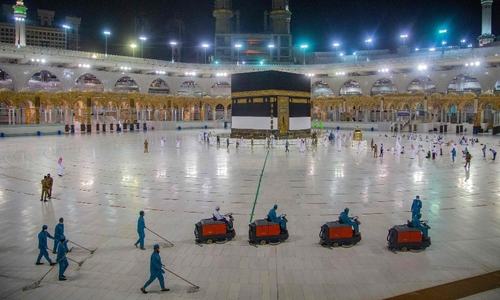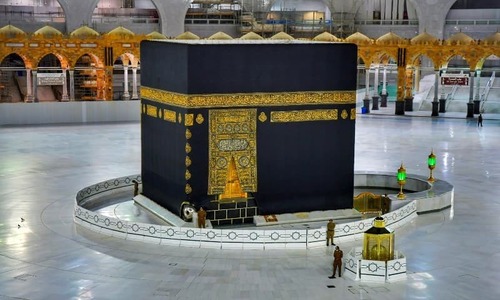Masked pilgrims arrived on Thursday at Mount Arafat, a desert hill near the Holy Kaaba, to pray and repent on the most important day of the Haj, in Makkah, Saudi Arabia.
The global coronavirus pandemic has cast a shadow over every aspect of this year’s pilgrimage, which last year drew 2.5 million Muslims from across the world to Mount Arafat, where the Prophet Muhammad (pbuh) delivered his final sermon nearly 1,400 years ago.
This year, a very limited number of pilgrims were allowed to take part in the Haj amid numerous restrictions to limit the potential spread of the coronavirus. The Saudi government has not released a final figure on the number of the pilgrims this year, but has said anywhere from 1,000 to 10,000 would be taking part. All of this year’s pilgrims are either residents or citizens of Saudi Arabia.
In past years, a sea of pilgrims dressed in white terrycloth garments would start to gather at Mount Arafat, or hill of mercy as it’s known, before dawn and remain there until nightfall, spending the day in deep contemplation and worship. It is common to see pilgrims with tears streaming down their faces, their hands raised in worship on the slopes of the rocky hill where the Prophet Muhammad called for equality and unity among Muslims.
The sliver of pilgrims performing the Haj this year arrived at Mount Arafat before noon by bus on Thursday. They were traveling in small groups of 20, following strict guidelines around social distancing, had undergone tests for the Covid-19 disease and were in quarantine before the Haj.
They made their way to the Namira Mosque at Mount Arafat led by health workers and listened to a sermon by Sheikh Abdullah bin Manea. "We thank all Muslims for their positive role in responding to [Saudi Arabia's] measures to protect them from the spread of the pandemic by imposing measures that ensure the protection of Makkah and Madinah,” Al Arabiya quoted him as saying during the sermon.
Unlike in past years, the pilgrims are not allowed to stand shoulder to shoulder with other Muslims from around the world, all considered equal in Islam before God, seeking mercy, blessings, good health, bounty and healing. Pilgrims are wearing wristbands this year provided by the Saudi Health Ministry that are connected to their phones and monitor their movements to ensure physical distancing.
After spending the day in prayer on Mount Arafat, pilgrims will head toward an area called Muzdalifa, about 5.5 miles west of Mount Arafat.
In Muzdalifa, pilgrims rest and traditionally pick up pebbles that will be used for a symbolic stoning of the devil and casting away of evil. This year, however, the pebbles have been prepackaged and sterilised.
The final ritual takes place over three to four days in Mina, about 12 miles east of Makkah. The final days of Haj coincide with Eidul Azha, or the festival of sacrifice, celebrated by Muslims worldwide.
Saudi govt extra cautious
Crowds of millions of pilgrims from around the world could be a hotbed for virus transmission, and in the past some worshippers have returned to their countries with respiratory and other diseases.
The government is extra cautious this time around.
On site, 3,500 workers spread across the Grand Mosque in Makkah to sanitise it using 54,000 litres of disinfectant and 1,050 litres of air fresheners daily.
The floors of the mosque are being scrubbed 10 times a day, up from three times in the past.
Six hospitals are dedicated to serving pilgrims, 51 clinics and 200 ambulances are spread across different sites with the support of 62 field teams and 8,000 healthcare professionals.
“The kingdom is relying on years of experience in managing the pilgrimage and has worked hard in collaboration with the WHO to ensure that the pilgrimage goes very smooth,” said Hanan Balkhy, assistant director-general of antimicrobial resistance at the World Health Organisation.















































